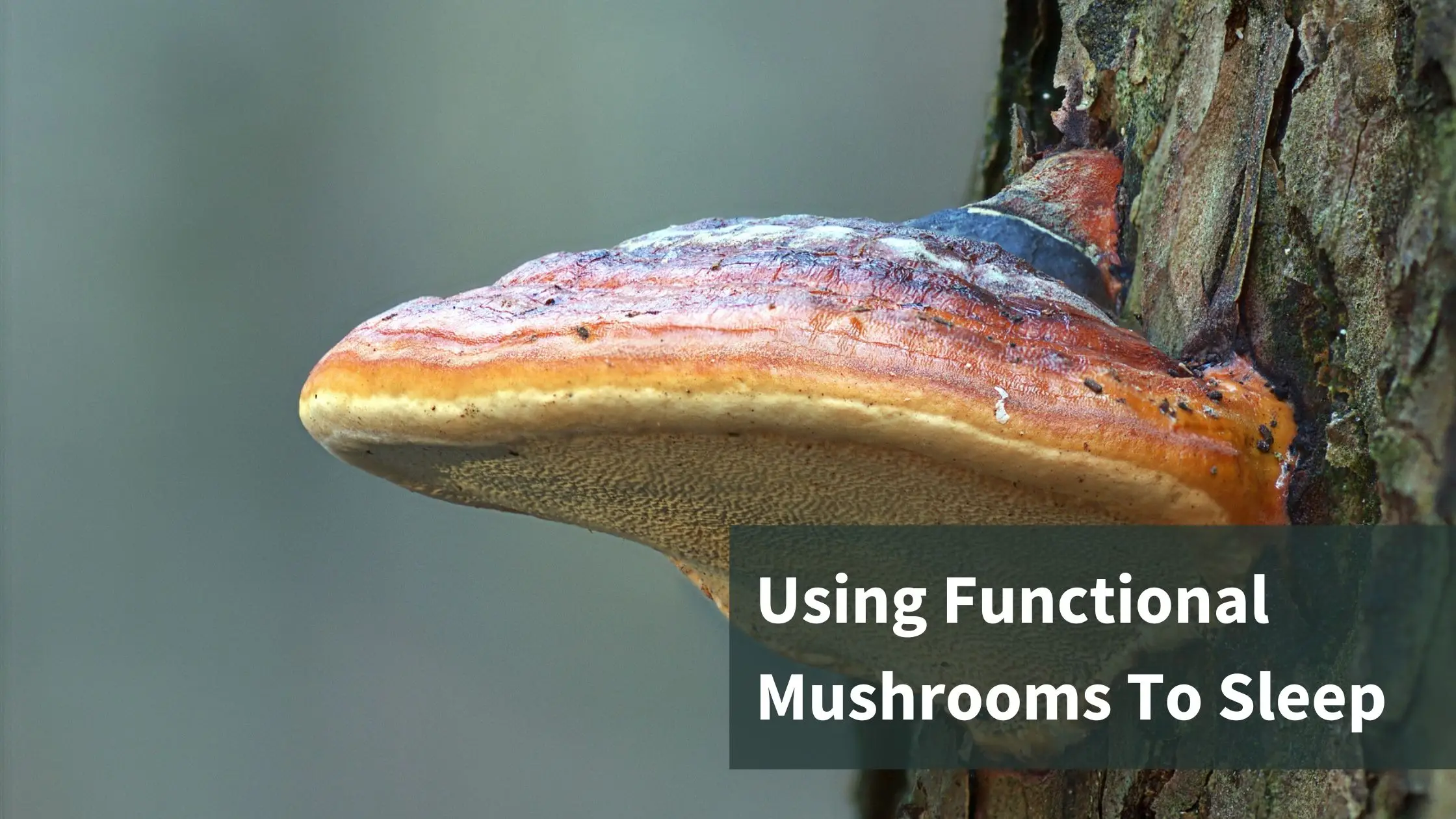No products in the cart.
Using Functional Mushrooms For Sleep: Do They Work?

In a world of on-call work and cell phones, quality sleep has become a coveted luxury. In recent years, a cottage industry of sleep apps, over-the-counter medications, and paid guided meditations has emerged. Natural remedies like CBD and cannabis-derived products excel as sleep aids, but is there something even more down-to-earth?
In this post, we’ll explore using functional mushrooms for sleep and,
- What types of mushrooms can help you get some shut-eye
- Different ways you can take your mushroom supplements
- And other techniques you can use to set yourself up for sleep success
The Importance of Quality Sleep
First, a word on sleep and why you need to get as much as you can. Studies show that sleep supports cognitive function, a healthy immune system, and plays a critical role in emotional health. Your brain, body, and mood literally depend on a solid eight hours.
On the other hand, sleep deprivation can lead to a host of issues, like
- Impaired memory
- Trouble concentrating
- Irritability
- Chronic issues like obesity, diabetes, and cardiovascular disease.
Odds are you already know all of this and want to figure out how to get your own sleep patterns in check. Without further adieu, let’s get into it.
Functional Mushrooms and Their Sleep Benefits
Some traditional medicine practices have used functional (medicinal) mushrooms as sleep aids for millennia. So, without making any health claims that would upset the Food and Drug Administration, let’s review how other cultures use mushrooms.
Reishi (Ganoderma lucidum):
- Benefits: Reishi, known as the “mushroom of immortality,” is renowned for its calming effects. Traditional Chinese medicine has used reishi for thousands of years to combat insomnia and restlessness. Some studies even suggest that in mice, reishi mushrooms can help reduce the time it takes to fall asleep and prolong total sleep time.1
- How it works: Reishi mushrooms contain several beneficial compounds like antioxidants and beta-glucans that promote gut and nervous system health.
Lion’s Mane (Hericium erinaceus):
- Benefits: Lion’s Mane Mushrooms are primarily taken to support cognitive function and concentration. However, we believe that by promoting healthy daytime habits, Lion’s Mane can inadvertently promote good nighttime habits (like feeling tired at night!)
- How it works: Lion’s Mane Mushroom contains a ton of beneficial beta-glucans and triterpenes that improve mood and energy throughout the day.
Chaga (Inonotus obliquus):
- Benefits: Chaga, while not a mushroom, is considered a functional fungi. Close enough, according to this author. Chaga contains antioxidants that some studies suggest reduce inflammation. Traditional medicines also use Chaga to boost immune function and promote overall health.
- How it works: Chaga’s anti-inflammatory properties can help reduce bodily stress and create a more conducive environment for sleep.
How to Incorporate Functional Mushrooms for Better Sleep
Now that you know which mushrooms promote restful sleep, let’s explore the different ways you can start integrating them into your daily routine.
- Mushroom Teas: If you want results and want them fast, try a cup of mushroom tea. Brewing a cup before bed can be a relaxing ritual. Reishi tea, made by mixing powdered reishi into water, can be especially calming.
- Tinctures: Add a few drops of mushroom extracts to your evening beverage. Look for tinctures that specifically target sleep and relaxation.
- Gummies: Not a fan of the mushroom taste? We don’t blame you. Many fungi are an acquired taste. Luckily, plenty of functional mushroom gummies are now on the market. Look for gummies that contain Reishi and Chaga.
- Capsules: For convenience, consider taking powdered mushroom capsules that are formulated for sleep support.
Upgrading Your Sleep Hygiene
Unfortunately, adding mushrooms to your nighttime routine isn’t going to be enough to conquer your sleep issues. They are an aid, not a solution. For better results, consider the following:
- Establish a Sleep Routine: Try to go to bed and get up at the same time every day. This includes weekends! Establishing a routine will help your body tune its internal clock and, by extension, your circadian rhythm.
- Environment: Ensure your bedroom is dark, cool, and quiet. Consider using blackout curtains and white noise machines to create a relaxing environment.
- Limit Screen Time: This is a big one. How many times have you found yourself scrolling endlessly for hours instead of sleeping? Try to reduce screen time at least one hour before bed. If you must, put your phone in a different room.
- Don’t Just Lay There: If you find yourself tossing and turning, unable to sleep, don’t just lay in bed. Get up, go to another room, and try to do something relaxing like reading or meditating. Try to avoid using technology. When you feel ready to try to sleep again, go back to bed.
Final Thoughts
If you’re at the end of your sleep-deprived rope, think about giving functional mushrooms a shot. By incorporating these ancient aids into your nightly routine, you can enjoy more restful sleep.
As always, be sure to consult with a health professional before you incorporate any new supplement into your regimen. That’s especially true if you have pre-existing health conditions and/or you’re taking medications.
Sources:
- Yao, Chunyan et al. “Ganoderma lucidum promotes sleep through a gut microbiota-dependent and serotonin-involved pathway in mice.” Scientific reports vol. 11,1 13660. 1 Jul. 2021, doi:10.1038/s41598-021-92913-6

